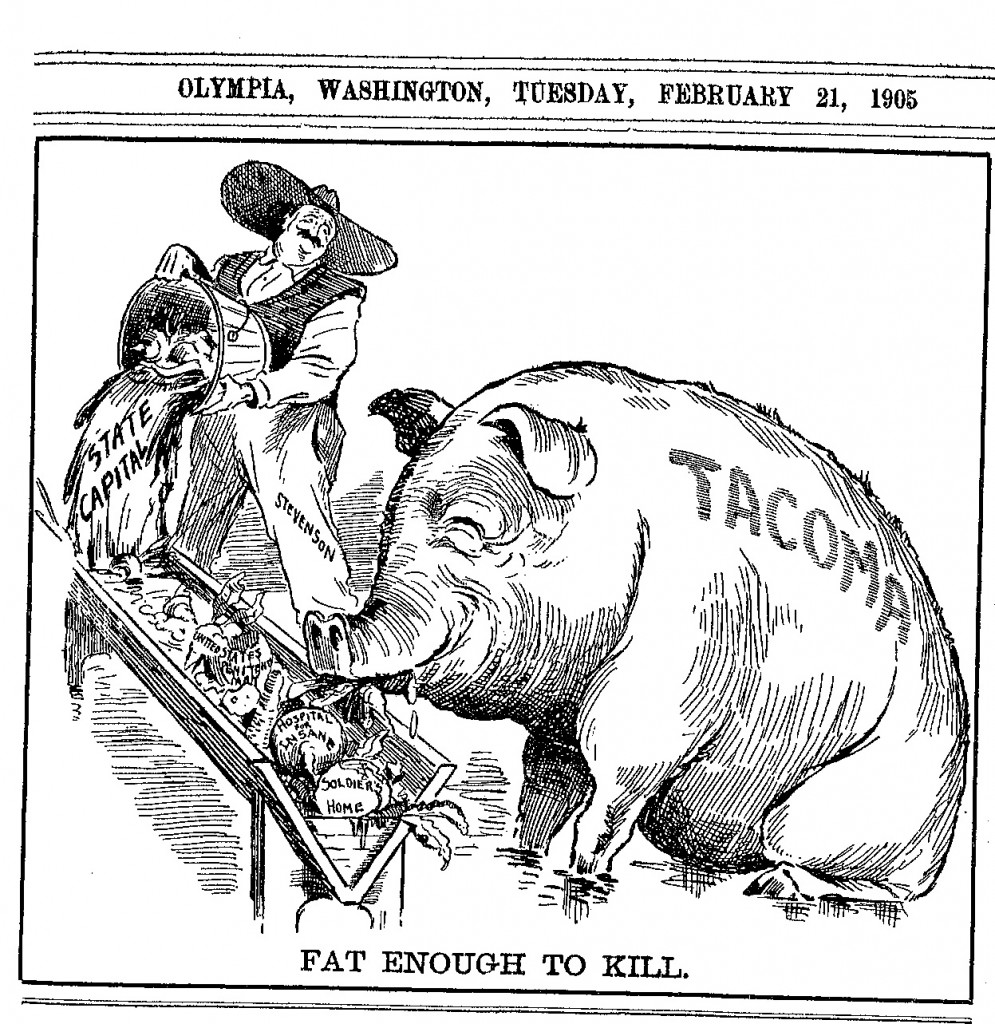Transplanting the Capital Campus to Tacoma
 From the desk of Steve Willis, Central Library Services Program Manager of the Washington State Library:
From the desk of Steve Willis, Central Library Services Program Manager of the Washington State Library:
Although this article found on page 3 of the Feb. 24, 1905 issue of The Marysville Globe wasn’t exactly local in nature, it had the potential to have a local impact. Plus it was interesting. So I decided to track down the story behind the story.
By 1905 Washington State was a decade and a half old. Olympia had already survived numerous attempts to be replaced as the capital city beginning with the formation of Washington Territory in 1853. The Legislature had left the old wooden capitol building, holding their last session in that structure in 1903.
The foundation had been built for a new legislative building in the mid-1890s, roughly on the same site of the present dome, but an economic downturn halted construction. John Rogers, the Populist Party governor who served from 1897-1901, felt it was more prudent to buy the Thurston County Courthouse and convert it to a legislative meeting place. So in 1905 the Legislature met for the first time in what is now the home of the Superintendent of Public Instruction in downtown Olympia. This would serve as the State Capitol Building for over two decades.
The Olympia Hotel, a grand structure that stood just southwest of the present Sylvester Park, burned to the ground on Nov. 16, 1904. By some accounts, this was the real State Capitol Building, where deals were made, laws were decided, and lobbyists reigned supreme.
One of those lobbyists was a gentleman named George Stevenson. More on him later.
This was the setting for the following pair of articles, printed next to each other:
CAPITAL REMOVAL
HOUSE DECIDES IN FAVOR OF TACOMA
Voice Was 55 to 36 in Favor of Removal, 3 Being Absent or Not Voting Unless Vetoed by Governor Matter Will be Voted On by People of the State
“Olympia, Feb. 18.–The capital removal bill has now passed both branches of the legislature and unless vetoed by the governor will be placed before the people for their approval or disapproval. The bill was taken up by the house as a special order at 10:30 yesterday morning, was read, the rules suspended, and the bill placed on final passage, adopted and passed. Ayes, 55; noes, 36; absent and not voting, 3.”
“A motion for a reconsideration of the vote will be made.”
“The passage of the bill was bitterly opposed by Booth and Todd of King county, as well as by the Thurston county delegation.”
“Mayor Wright of Tacoma, who appeared before the committee a few nights ago, offered on behalf of Tacoma to present to the state for capitol site purposes Wright park, now a city reservation worth at least half a million dollars, and containing 60 acres.”
“Mayor Wright also offered to provide in Tacoma suitable temporary quarters for all state officers, for the supreme court and state library to be used free of charge to the state until such time as a new capitol building is completed.”
GOVERNOR AGAINST IT
Said He Will Veto Capital Removal Measure
“Olympia, Feb. 20–The story is currently here and generally believed that Gov. Mead has stated to his personal friends and political advisors that he will veto the capital removal bill.”
“‘I do not believe the state should further saddle itself with such a burdensome debt at this time,’ is what the governor is quoted as saying.”
“Notwithstanding that there is a question whether the governor has the power to veto the bill, there seems to be no question in Gov. Mead’s mind regarding his authority on the matter.”
Now, back to George Stevenson. He was a campaign manager and lobbyist who had convinced the Tacoma area timber and real estate interests that moving the capital campus to their home region would be mutually beneficial. Although Stevenson was able to persuade the Legislature, the newspapers of the state rose up against the idea. One Olympia newspaper ran a cartoon of Stevenson feeding an overstuffed swine named “Tacoma.”
Gov. Mead vetoed the bill, thus ending the last attempt to move the Legislature out of Olympia. Historian Gordon Newell humorously describes Olympia’s subsequent call for a two year economic boycott of Tacoma, and Tacoma’s gesture of apology by sending down boatloads of citizens and dignitaries, and the resulting reconciliation in his wonderful book, Rogues, Buffoons & Statesmen.